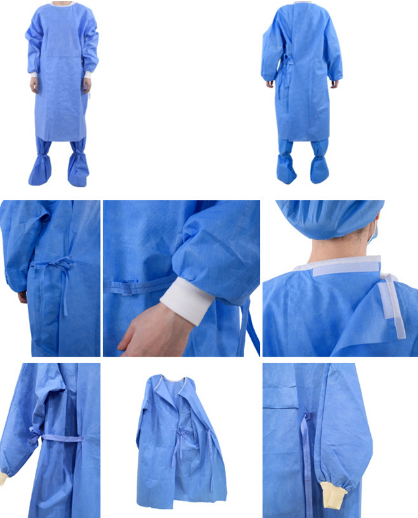Guide for Choosing an Disposable Surgical Gown
In the realm of healthcare, especially in surgical settings, one cannot underestimate the importance of proper personal protective equipment (PPE). Among the critical components of PPE, disposable surgical gowns play a pivotal role in ensuring the safety of both healthcare professionals and patients. Selecting the right disposable surgical gown is not only a matter of compliance but also a fundamental step in infection control and prevention. In this comprehensive guide, we will delve into the intricacies of choosing the most suitable disposable surgical gown for your needs.

Understanding the Significance of Disposable Surgical Gowns
Before we dive into the specifics of selecting a disposable surgical gown, it's crucial to understand why these gowns are a cornerstone of infection control in healthcare settings.
The Role of Disposable Surgical Gowns in Infection Control
Disposable surgical gowns act as a protective barrier between healthcare workers and patients during surgical procedures. They are designed to prevent the transfer of microorganisms and bodily fluids, reducing the risk of cross-contamination.
Compliance with Regulatory Standards
To maintain a safe healthcare environment, it's imperative to choose surgical gowns that comply with industry and regulatory standards. These standards ensure the quality and effectiveness of the gowns in preventing the spread of infections.
Factors to Consider When Choosing Disposable Surgical Gowns
Selecting the right disposable surgical gown involves a careful evaluation of various factors. Let's explore these factors in detail:
Material Matters
The choice of material for your disposable surgical gown is paramount. Common materials include polypropylene, SMS, and spunlace. Each material has its unique characteristics, such as breathability and fluid resistance.
Level of Protection
Different surgical procedures require varying levels of protection. Gowns are classified into levels based on their resistance to fluid penetration. Understanding these levels is essential to make an informed decision.
Comfort and Mobility
Healthcare professionals spend extended hours in surgical gowns. It's vital to choose gowns that offer comfort and mobility without compromising safety.
Sizing and Fit
Ill-fitting gowns can hinder a healthcare worker's ability to perform effectively. Ensure that the gown you choose comes in various sizes to accommodate different body types.
Closure Mechanisms
Disposable surgical gowns typically come with either ties or snaps for closure. Consider the ease of donning and doffing when selecting the closure mechanism.
Additional reading:Things You Should Know About Trocars
[Inventory] Explore Prominent Health Medical Companies Worldwide
Advancements in Portable Ultrasound Technology: A Comprehensive Review
Applications of Medical Electronics PCBA
Benefits of Using Disposable Shoe Covers in Healthcare Settings
What are Types of Lower Limb Prosthesis?
How to Choose the Right Bed for Home Use
Sterility (H3)
Maintaining sterility is a priority in surgical settings. Ensure that the gowns are packaged and sterilized according to industry standards.
Bursting the Bubble: Common Misconceptions About Disposable Surgical Gowns
Let's address some common misconceptions that often cloud the decision-making process when it comes to selecting disposable surgical gowns.
Myth 1: One Size Fits All
Contrary to popular belief, one-size-fits-all gowns may not provide the necessary level of protection for all healthcare professionals.
Myth 2: All Gowns Are Created Equal
Not all disposable surgical gowns are equal in terms of protection and quality. It's essential to research and choose reputable brands.
Myth 3: Comfort Doesn't Matter
Comfort is not a luxury but a necessity. Uncomfortable gowns can lead to distractions and reduced efficiency in the operating room.
Conclusion
Choosing the right disposable surgical gown is a decision that impacts both patient safety and the well-being of healthcare professionals. By considering factors such as material, protection level, comfort, sizing, closure mechanisms, and sterility, you can make an informed choice that promotes a safer healthcare environment.
FAQs
1. How often should disposable surgical gowns be changed during a procedure?
Disposable surgical gowns should be changed whenever they become visibly soiled or compromised to maintain a sterile field.
2. Can disposable surgical gowns be reused?
No, disposable surgical gowns are designed for single-use only to prevent cross-contamination.
3. Are there eco-friendly options for disposable surgical gowns?
Yes, some manufacturers offer eco-friendly disposable surgical gowns made from biodegradable materials.
4. What is the significance of the ASTM classification for surgical gowns?
The ASTM classification indicates the level of protection provided by a surgical gown, helping healthcare professionals choose the appropriate gown for specific procedures.
5. Can disposable surgical gowns be customized for branding purposes?
Yes, some manufacturers offer customization options for disposable surgical gowns, allowing healthcare facilities to add their logos or branding.
Additional reading:Understanding the Constraints of Prosthetic Limbs
What kind of drapes are used in surgery?
Which is better foam sponge or cellulose sponge?
DHA Capsule Supplement: Exploring Its Benefits


